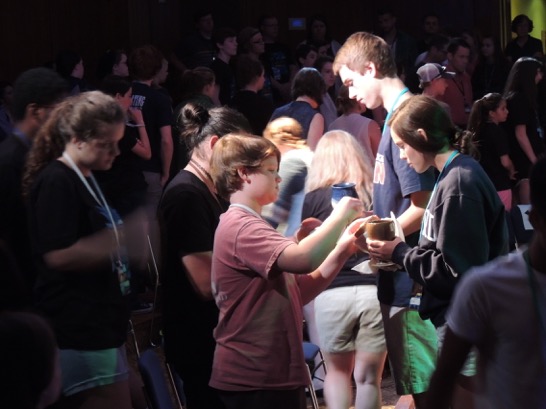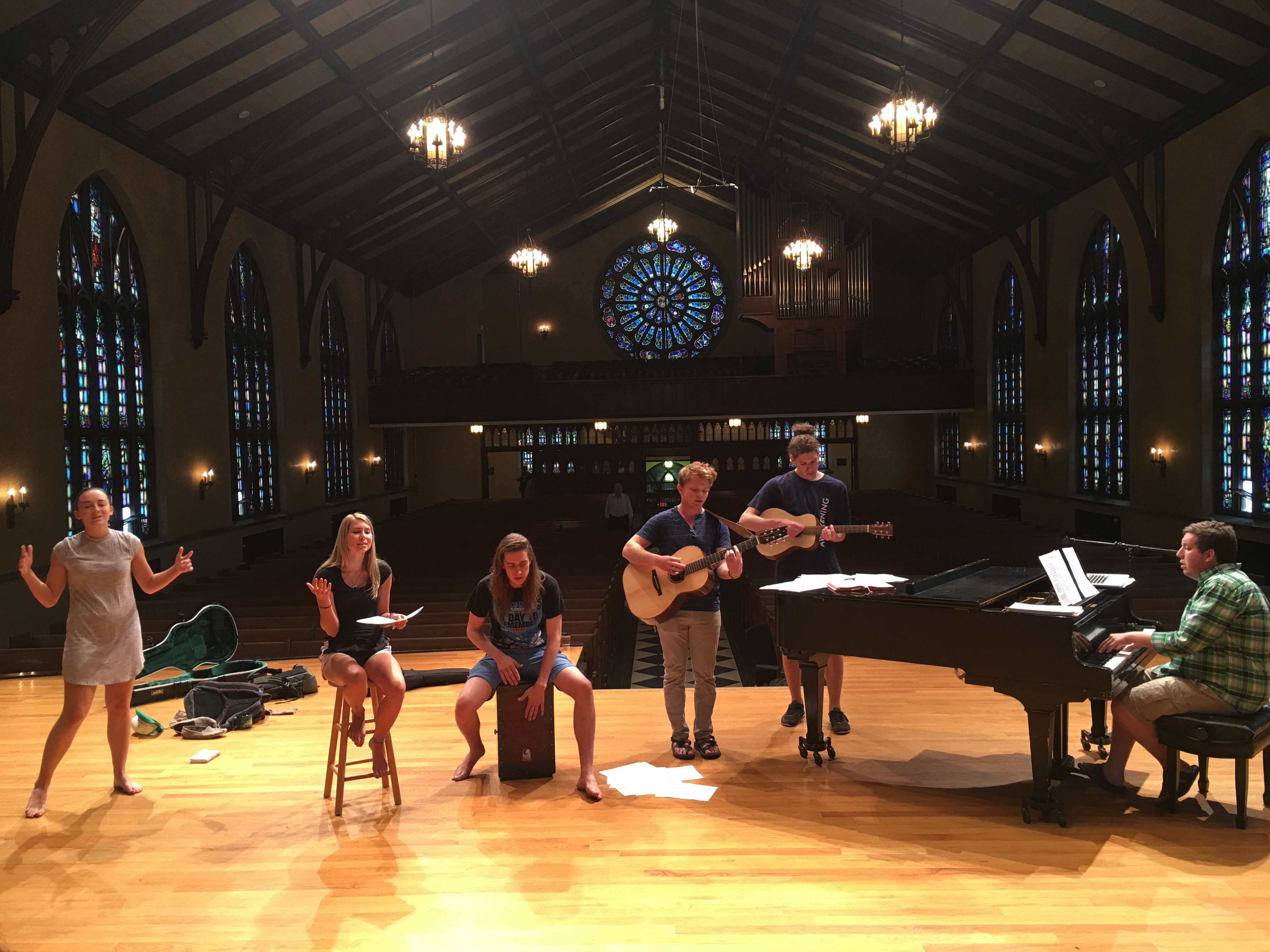Why Youth Need to Be Leading Worship Regularly NOW
When congregations empower teenagers to use their gifts in meaningful ways over time, teens are more likely to imagine themselves as faithful disciples and devoted worshipers for decades to come. Two summer programs in worship, theology, and the arts inspire teens and mentors.
One teen prays a historic prayer in worship, and another performs the first liturgical dance a church has ever had. Still other youth are up front as the primary worship leaders. You might assume that all this is taking place in an annual youth service—one where the pastor says, “These youth are the future of the church!” Then it’s back to normal with the grownups taking over till the next youth service.
But the examples above actually come from churches and schools that see teenagers as “the church now,” as Eric Mathis puts it. He teaches music and worship and directs anima | the Center for Worship and the Arts at Samford University in Birmingham, Alabama.
“Worship has the potential to be the most important training ground for young people to hear and tell the story of God working in the world,” Mathis says. “Worship has the potential to form their identities as God’s image bearers who matter in God’s kingdom and have a place in Christ’s body just as they are. Yet churches too often limit the role of young people in worship and place them in separate buildings and spaces, away from adults and children. This robs the church of all ages the opportunity to worship with the complete body of Christ.”
In 2014 Mathis started Animate, a five-day summer program for teenagers and their adult mentors. Sponsored by the Center on the Samford campus, Animate hones students’ worship skills, sharpens adults’ mentoring skills, and helps everyone explore the intersection of worship, theology, and the arts. Jim DeBoer runs a similar program for teens, Awakening, at Hope College in Holland, Michigan.
Results from Animate and Awakening show that mentoring high schoolers in worship skills, theology, and the arts helps congregations make good on their desire to be truly intergenerational.
Imagine worship as an intergenerational process
“We began Animate as an intergenerational endeavor,” Mathis explains, “because literature and research say that intergenerational worship and mentoring relationships with at least five adults in the church are key factors in teenagers’ faith lasting beyond high school. Teenagers need agency to find their place and role in church, and adults can help them do that.”

Animate students share communion.
Animate averages 75 to 100 participants per summer. They’ve ranged in age from 12 to 72, with a 58:42 female to male ratio and a 70:30 student to adult ratio. These students represent a wide range of races and ethnicities and come from Protestant and Roman Catholic traditions in the Southeast and Midwest. Those who attend with an intergenerational team from their church are most likely to implement what they learn and to return the next summer.
Animate participants experience a wide range of worship styles and practices. They learn about the arts in classes and at museums, plays, and concerts. In daily “Toolbox Sessions,” students build practical skills in planning and leading worship. Adults learn how to deepen relationships and conversations with teens. The week ends with a Festival of Worship.
The camp is staffed by students from Samford University, Auburn University, and Calvin College. They lead small groups of teens in spiritual practice and reflection. Animate does tiered mentoring: The college students who mentor teens are themselves mentored by preachers and worship leaders. Adults also meet during the week to learn from intergenerational worship experts and each other.
“We often say that Animate is a process, not a product,” Mathis says. “Our week-long event is an invitation into a process of inviting teenagers into the worship life of the church as leaders and deeply engaged participants.”
After a worship pastor and teen from one church attended Animate, the worship pastor asked the young man to join him in studying online for a worship leadership certificate from anima | the Center for Worship and Arts at Samford. As a result of repeat teams at Animate, a congregation in Houston, Texas, formed an intergenerational worship team that includes teens each week. Now the church has made room for teens to serve on any church committee according to their giftedness.
Teaching theology along with worship leadership
Leaders of Animate and Awakening say it’s vital to teach theology along with worship skills.
Teaching the how—the mechanics of worship—without reflecting on the why results in worship that “may become misguided or lack coherence with key tenets and values of our Christian faith,” says Emily Andrews, music and worship teacher at Samford and Animate’s assistant director. “When worship leaders attend to both the theology and practice of worship, the gathered body of Christ is more deeply nourished.”
Students practice welcoming worshipers; reading Scripture and publicly praying; choosing, rehearsing and introducing songs; conducting themselves as worship leaders; and writing testimonies and devotionals. For the Festival of Worship, each small group plans and leads an entire worship gathering, and teens experience worship designed by their peers.
“This all-day event invites them to synthesize their learning,” Andrews says. “Samford college students are trained to ask questions that help teenagers reflect more deeply about the entire worship planning process. This active engagement helps students combine theological and high-order reflection with applied skills, such as music making.”
Animate teaches the same worship, theology, and leadership concepts to teens and adults because “this kind of replication among teens, their mentors, and all adults is an important part of anima’s mission: to empower teenagers as key members of Christ’s church in the present,” Andrews says.
Besides giving mentors time to learn with intergenerational ministry and worship experts, Animate also provides opportunity for adults to be guided by teens. Mathis recalls planning an hour-long panel discussion on worship in Baptist, Catholic, nondenominational, and Presbyterian churches. Instead, teens spent half the time asking about how Roman Catholics and Baptists could get along better. Going off-topic became one of the week’s “most engaging moments, because we gave teenagers space to explore something that rose out of their thinking and experience,” Mathis says.
Rich theological conversations
Thinking theologically also is a big part of Awakening. Its 2016 launch drew a multicultural group of 20 teens from four states and several church traditions for six days at Hope College in Holland, Michigan.
“Most arrived thinking of worship as musical praise offerings to God,” says Awakening director Jim DeBoer, who also teaches music at Hope. “Few knew how to construct a worship service with elements of gathering, praise, confession, assurance, message, response, and sending. They were very intrigued when we discussed the why and varied how of worship.
Awakening students practice leading music.
“We also discussed at length that leaders have visible and invisible roles,” DeBoer added, “whether playing organ, guitar or drums or in singing, painting or drama. If worship is not about us, and we are called to lead, how can we ‘get out of the way’ and attract others to God without distraction?”
Bruce Benedict, Awakening’s worship leader and Hope’s chaplain of worship arts, said the best conversations were about how worship is “so much more than just music” and that it includes the arts and all of life. “We could help nurture and stretch their faith, because these high school students came hungry to learn more about something they intuited—that there should be a rich connection between their faith and the arts,” Benedict says.
“We invited them into a broad range of worship expressions—contemporary and classical, song and silence, indoors and outside in creation—all rooted in the historic flow of gathering, word, and sending. We invited students to see worship in their daily rhythms of life and helped them discern how to use their gifts in worship services and other ways.”
Making room for youth to serve and lead
In his 30 years of teaching music in public and Christian schools from pre-K to college, DeBoer has met students gifted in music, dance, theater, art, and technology. And in his 30 years of leading worship in several churches, he’s noticed how few youth are using their gifts in corporate worship and beyond to glorify God. Instead, many young adults drift away after high school.
“The research data is well known,” DeBoer says. “Millennials are disengaged from the local church, not attending church or saying church is not relevant to their lives. I am deeply concerned for the future of the church if we do not provide opportunities for youth to lead and develop worship models that resonate with their generation.”
That’s why he was so encouraged by evidence that Awakening helps nurture students’ gifts, cultivate their passion for God, and awaken their sense of calling to use their gifts and passion in “God’s huge kingdom for something beyond themselves.”
DeBoer, Benedict, and the Awakening students have stayed in touch. Every student has found a place to serve, including school chapel, church worship committees, church choirs, praise teams, or youth ministry. Some are in rotation as the primary leaders of worship in their churches, and some are now considering worship leading as a career.
Links
LEARN MORE
Samford University’s anima | the Center for Worship and the Arts sponsors Animate, a summer program for teens and adults in worship leadership. It also offers an online worship leadership certificate. Eric Mathis, anima director, gives practical advice for expanding teens’ vision of worship.
Hope College hosts Awakening, a summer program for teens in worship, theology, and the arts.
View short worship lessons, worship services, and other resources created by and for campus ministry teams at Calvin College, Hope College, and Samford University. You can use them to start mentoring teens in your worship context.
Each January, intergenerational teams from colleges, churches, and Christian schools train together at the Calvin Symposium on Worship in Grand Rapids, Michigan.
START A DISCUSSION
Feel free to print and distribute these stories at your staff, board, liturgy or worship meeting. These questions will help people start focusing on how they can help all ages worship more fully, consciously, and actively:
- What first steps could you take to make sure that all ages understand why you do what you do in worship? If worship in your context is divided by age, what is the reason, and how do you create a sense of being one church together?
- List all the roles that your church or faith-based school offers for people to participate in worship and liturgy. Which are limited by age, gender, training, or certification?
- Share a story of something adults learned when youth contributed their ideas and gifts in a worship setting.
